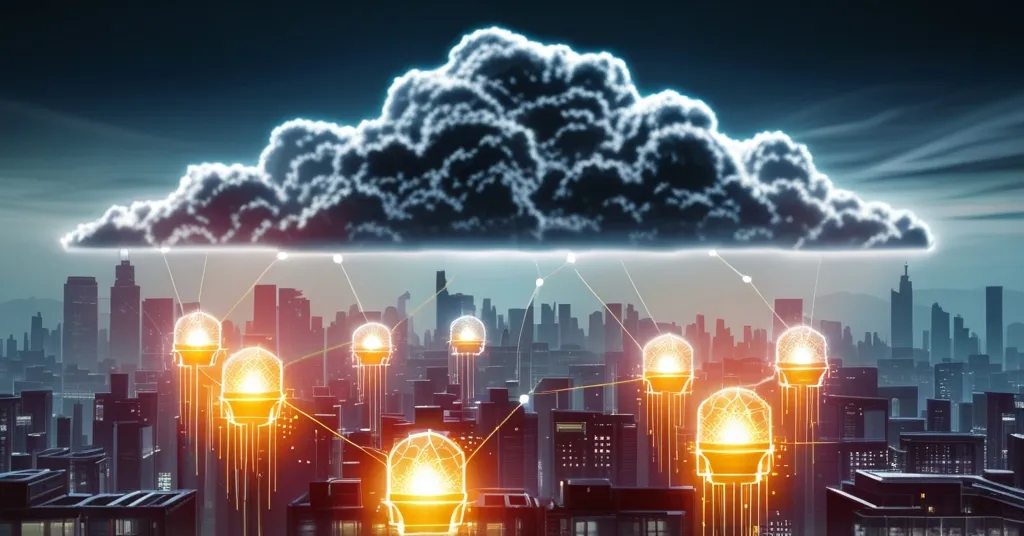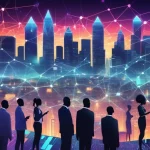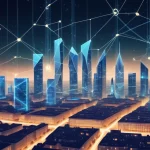Mike Novogratz: Blockchain Can Shield Us from AI Dangers, Boost Efficiency

Billionaire Mike Novogratz Sees Blockchains as a Shield Against the Dangers of AI
Mike Novogratz, the CEO of Galaxy Digital, recently shared his belief that blockchain technology could serve as a safeguard against the potential dangers of centralized artificial intelligence (AI). In an interview, he drew parallels between AI and the centralized databases depicted in the movie “Minority Report,” suggesting that blockchain’s decentralized nature could counterbalance the centralizing force of AI. Novogratz also highlighted the practical benefits of blockchain for AI agents, proposing they could handle transactions more efficiently using blockchain technology compared to traditional financial systems.
- Novogratz believes blockchain can protect against centralized AI
- Compares AI to “Minority Report” databases
- AI agents could use blockchain for efficient transactions
Novogratz’s vision is clear: he sees blockchain as a counterbalance to AI, a decentralized force that could mitigate the centralizing power of AI. “I intuitively think that AI is really scary,” he said. “And I go back to the Minority Report, that movie with the precogs and the pictures, and so it is one of the great centralizing forces on the planet – huge database centralized. And so the Yang to that Ying has to be blockchain.”
While Novogratz admits to not fully understanding the technical details, his intuition is grounded in a broader concern for privacy and autonomy. “And I don’t know how it works yet. I’m not smart enough. I just intuitively know there’s got to be something that protects us from Big Brother, and blockchains have that capacity,” he confessed. This candidness is a breath of fresh air in an industry often clouded by overhyped promises and grandiose claims.
On the practical side, Novogratz envisions blockchain as a game-changer for AI agents. Your AI assistant handling your grocery shopping or other transactions could do so more seamlessly on blockchain than on traditional financial systems. “And the other piece of it is these AI agents. Your agent’s going to know what to shop for you, like groceries. Well, where’s it going to get the money? It’s going to have to go into your account, send the money. That stuff is going to operate much smoother, I think, on cryptocurrency networks than on the rails, Amex uses or MasterCard uses,” he explained. This could significantly enhance efficiency and privacy, as blockchain offers a level of control and security that traditional finance systems struggle to match.
However, integrating blockchain with traditional financial systems is not without its challenges. Interoperability remains a hurdle, and the potential misuse of blockchain’s privacy features for illicit activities is a concern we must address head-on. While the promise of blockchain is alluring, we can’t ignore the gritty realities that come with it.
Novogratz’s perspective is supported by Galaxy Digital’s research, which delves into how blockchain can serve as a settlement layer for AI, enhancing privacy, security, and efficiency. The report explores the emergence of decentralized compute protocols and zero-knowledge machine learning (zkML), which could be pivotal in this integration. These technologies, which allow computations to be verified without revealing the data involved, could help ensure that AI models operate securely and privately on blockchain networks.
Yet, the road ahead is not without obstacles. Regulatory hurdles and technical challenges loom large. The rise of decentralized AI networks is a promising development, but it’s also a reaction to the regulatory clampdowns seen at places like OpenAI. While blockchain offers exciting potential, we must remain vigilant about its darker uses, such as the potential for money laundering or other illicit activities.
So, what does this mean for the future of blockchain and AI? Let’s break it down:
- What is Mike Novogratz’s view on the relationship between AI and blockchain?
Novogratz believes that blockchain technology can serve as a protective counterbalance to the centralizing and potentially dangerous effects of AI.
- How does Novogratz see blockchain technology benefiting AI agents?
He suggests that AI agents could handle transactions more smoothly using blockchain technology compared to traditional financial systems.
- What specific example does Novogratz use to illustrate the potential risks of AI?
He references the movie “Minority Report” to highlight the centralizing power of AI and large databases.
- What are Novogratz’s concerns regarding his understanding of how blockchain can protect against AI?
Novogratz admits he does not fully understand the mechanics of how blockchain might protect against AI but intuitively believes in its potential to do so.
- Which companies does Novogratz mention in comparison to blockchain technology for transaction efficiency?
He mentions Amex and MasterCard as examples of traditional financial systems that blockchain could outperform in handling transactions for AI agents.
In the end, Novogratz’s vision is a rallying cry for the crypto community. Blockchain might just be the tool we need to keep AI in check, but it’s up to us to make it happen. Whether you’re a Bitcoin maximalist or an altcoin enthusiast, there’s a role for everyone in this revolution. Let’s embrace the challenge and build a future where technology serves us, not the other way around.



